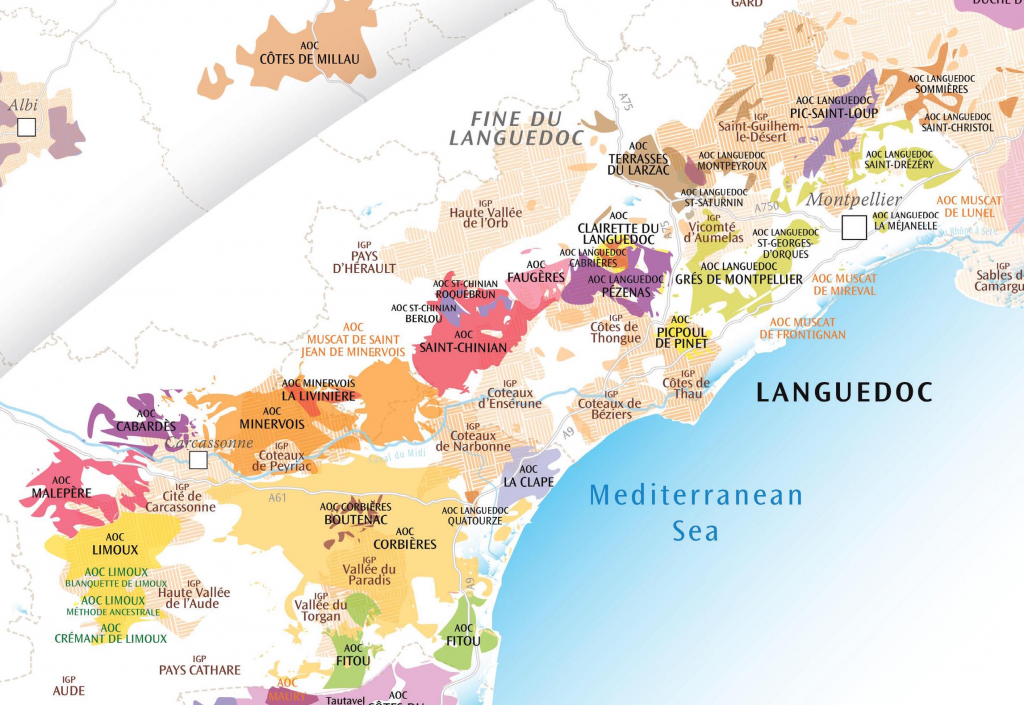Picpoul de Pinet, located in the heart of the Languedoc region in southern France, is one of the Mediterranean’s most refreshing and underrated white wine appellations. Known for its lively acidity, aromatic freshness, and easy drinking style, Picpoul de Pinet has gained popularity as a versatile wine to pair with seafood, yet its deep history and unique terroir deserve a closer look. Let’s dive into the region’s characteristics, winemaking practices, and the signature wine that is making waves in the global wine market.

The Terroir: Between the Sea and the Sun
Picpoul de Pinet is nestled on the shores of the Étang de Thau, a large lagoon, which lies just inland from the Mediterranean coast. This strategic location allows the region to benefit from the cooling breezes that blow in from the sea, moderating the hot summer temperatures typical of the Languedoc. The interplay between the coastal climate and the warm Mediterranean sun allows the grapes to ripen slowly, preserving their acidity while achieving full maturity.
The soils of Picpoul de Pinet are primarily made up of limestone, clay, and gravel, which contribute to the minerality and freshness found in the wines. The proximity to the water not only influences the climate but also imparts a subtle salty character to the wine, often described as a “sea breeze in a glass.” This distinctive terroir has made the region famous for producing wines with a perfect balance of acidity and fruit, ideal for pairing with the seafood dishes that dominate local cuisine.
The Picpoul Grape: A Resilient Ancient Varietal
The Picpoul grape, also called Piquepoul (meaning “stings the lip”), is a centuries-old varietal native to the Languedoc region. The grape’s name comes from its naturally high acidity, which delivers a sharp, zesty profile that is one of its most prized characteristics. Historically, Picpoul was used to add acidity to blends, but today it is almost exclusively bottled as a single varietal wine in the Picpoul de Pinet AOC (Appellation d’Origine Contrôlée).
Picpoul is a late-ripening grape that thrives in the warm Mediterranean climate, producing wines with a refreshing crispness that is perfect for hot weather. It also has thick skins that protect the fruit from intense sun exposure and preserve acidity. While the Picpoul grape can be found in other parts of the Mediterranean, it is in the Picpoul de Pinet region that it reaches its full potential, thanks to the ideal growing conditions provided by the terroir.
The Wine: Bright, Crisp, and Refreshing
Picpoul de Pinet wines are renowned for their vibrant acidity, crisp texture, and refreshing fruit flavours. Most Picpoul de Pinet wines are made from 100% Picpoul, although small amounts of other local grapes may be allowed in certain cases. These wines are typically not aged in oak, which helps preserve the fresh fruit flavours, making them an ideal choice for consumers who enjoy light, aromatic whites.
On the nose, Picpoul de Pinet is often marked by citrus aromas, such as lemon, lime, and green apple, with subtle floral notes and hints of white peach or pear. On the palate, the wine is crisp and refreshing, with flavors of lemon zest, lime, and green herbs. The acidity is the star of the show, offering a lively, mouthwatering finish. The characteristic salinity, imparted by the region’s proximity to the sea, adds a layer of complexity, enhancing the wine’s refreshing qualities and making it a perfect pairing for seafood.
A Growing Reputation: Picpoul de Pinet in the Global Wine Market
Picpoul de Pinet is experiencing a renaissance, thanks to the growing demand for fresh, crisp white wines. In recent years, wine enthusiasts have been drawn to this refreshing alternative to Sauvignon Blanc and Albariño, particularly due to its affordability and versatility. With more wine lovers seeking wines that are light, dry, and food-friendly, Picpoul de Pinet has made a name for itself as an approachable, high-quality wine that delivers great value.
Many producers in the region are focusing on sustainable viticulture practices, with some adopting organic or biodynamic farming methods. This attention to detail has resulted in higher-quality wines that highlight the pure expression of the Picpoul grape and the region’s unique terroir. As a result, Picpoul de Pinet has seen an increase in recognition both in France and internationally, earning its place on wine lists around the world.
Conclusion: The Taste of the Mediterranean
Picpoul de Pinet is more than just a wine; it’s a reflection of the Mediterranean’s unique terroir, where sun, sea, and soil come together to create a wine that is both refreshing and complex. Whether you’re sipping it on a warm summer day or pairing it with a seafood feast, Picpoul de Pinet offers an authentic taste of the Languedoc region. As the world begins to discover its charm, Picpoul de Pinet is undoubtedly a wine to watch, one that brings a slice of southern France to your glass.
By delving into its history, terroir, and winemaking practices, Picpoul de Pinet is gaining the recognition it deserves, offering a fresh, vibrant alternative to other white wines on the market. Its versatility with food, coupled with its refreshing nature, makes it an enduring favourite for many.